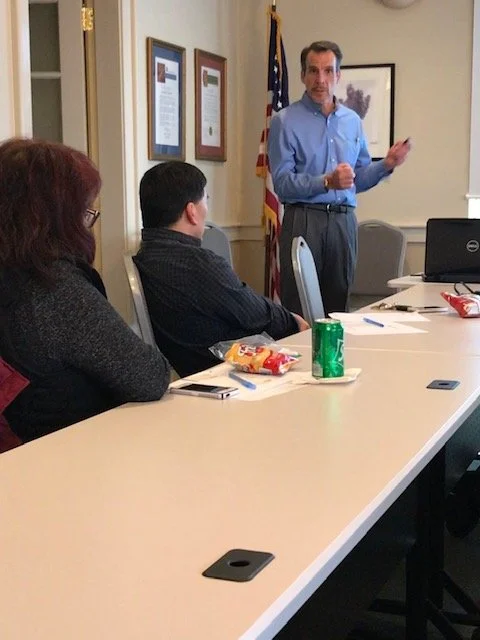
Adding Value By Helping Clients Make The Right Decisions and Avoiding the Wrong Ones!
Financial Planning For Your Future
(925-216-1814
anthony@carrwealth.com
The firm’s owner, Anthony B. Carr, CPA, CFP®, MBA, has over 39 years of experience safeguarding assets for companies as a controller or CFO in the private sector and has operated his own investment management company for the past 25 years. Anthony takes tremendous pride in the type of personal attention and understanding of your situation that most firms do. Our firm provides the following advantages for our clients:
Experience and Knowledge
We combine tax, planning, and investment knowledge with a more efficient and streamlined source of advice, guidance, and expertise to support our clients in achieving their financial goals and objectives.
Independence
The first step in adding value is choosing an independent planner over someone who works for a company that sells proprietary products. There are other variables to consider, but I believe a client’s best interests are better served by someone who has no monetary incentives to sell products. We are not in competition to win trips, cruises, or stays in luxurious resorts. We understand where the money comes from to pay for all that.
Fee-Only
We are a Registered Investment Advisory firm and charge our clients on a fee-only basis. Fees for financial services, excluding investment management, are charged at an hourly rate. The agreement is between you and Carr Wealth Management, LLC only (no outside parties).
Fiduciary Duty
Being a fiduciary requires always acting in the client's best interest. This should seem plain and obvious, but surprisingly, many individuals in the planning industry are not legally bound to a “best interest standard.” Instead, they are held to a less stringent “suitability” standard.
Other requirements of the rule include disclosing any conflict-of-interest issues, such as revenue-sharing agreements that companies often enter into with other companies, and providing full disclosure of all fees, whether paid directly or indirectly.
The Financial Life Cycle - Where are you at now?
I believe there are three main stages of a person’s financial life:
The accumulation phase typically spans many years, during which families are formed, assets are acquired, and one or both spouses advance in their careers. The sources of income may be from wages, business interests, investments, rentals, royalties, and possibly inheritances. The investment strategy during this phase has the advantage of longer time horizons, which may allow for greater risk tolerance and higher expected returns.
The distribution phase generally begins at retirement, and I consider this stage to be the most challenging, as it requires a delicate balancing act between all phases of the financial cycle. There’s still a need to accumulate wealth, identify the most efficient tax distribution strategies, and preserve wealth. But as we move farther along the financial life cycle, risk factors change – once retirement begins, income may be reduced, sometimes significantly. Time horizons are becoming increasingly shorter, and concerns about liquidity and inflation are intensifying. The result of the changing risk factors is that the risk level the investor is willing to accept is usually lower than during the accumulation phase. However, reducing risk exposure typically means accepting lower expected returns, which may create long-term issues if inflation rates persistently outpace the returns on investments.
The preservation phase is generally associated with much lower risk tolerances due to shorter time horizons. The emphasis for those in this stage is usually keeping what they have to fulfill family transfer goals and ensuring sufficient income for possible longer life expectancies.
The Plan - Where do you want to go?
Goals are the driving force behind a financial plan. Your goals today may or may not be the same ones you have in the future. There’s a strong probability that they will change to some degree. But specific goals, such as essential living expenses and health care, will be constantly needed throughout your lifetime. Other goals that are considered not minimum essentials can be included in your plan, and the analysis will be performed to quantify each goal – “how much will it cost.” It is only after assigning numbers to the goals that we can make informed choices regarding modifications (such as reducing the goal cost or eliminating it)
Carr Wealth Management, LLC utilizes the #1 software planning tool in the U.S., Evestnet MoneyGuide.
MoneyGuide is the first collaborative, internet-based financial planning software to offer a unique, client-centered approach. The goal-based planning approach is meaningful to the client and more productive for the advisor.
Video - The Benefits of Planning
Please view the brochure “Get the Most Out of Retirement” to learn the process and importance of today’s financial planning engagement.
Please review the “Lifestyle Workbook” to view the type of information required to develop a plan that helps you achieve your financial goals.
Please Contact Us
Carr Wealth Management, LLC
4695 Chabot Dr.,Ste. 200
Pleasanton, CA 94566
email: anthony@carrwealth.com
FINRA CRD#281343
NO-CHARGE INITIAL CONSULTATION





